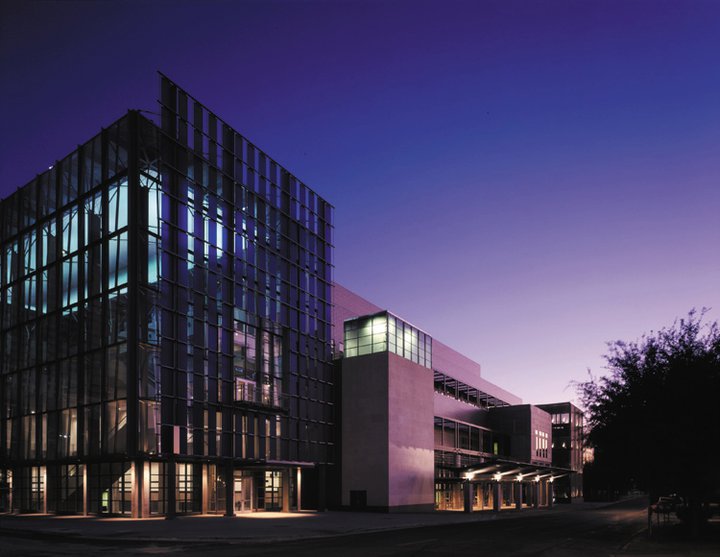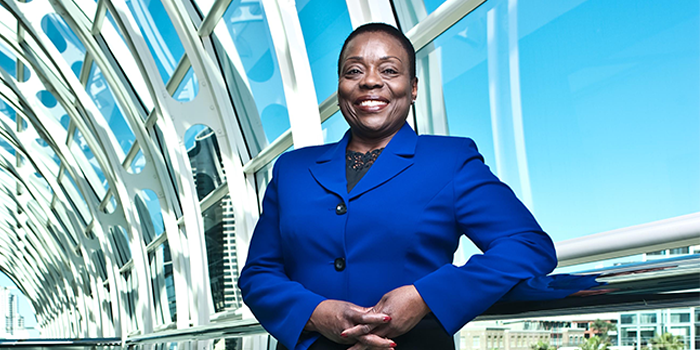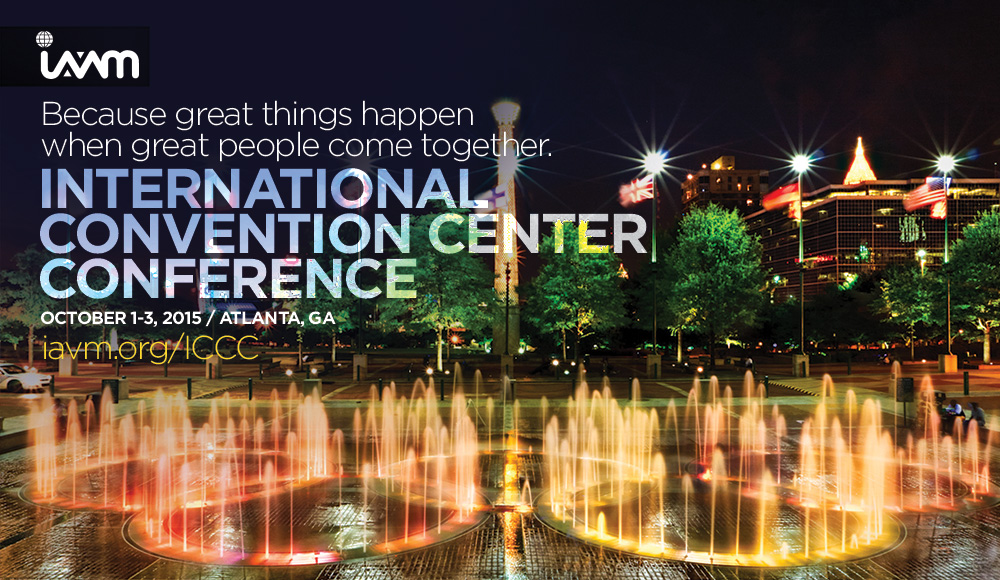Star Wars Lands in Disney; World Does Happy Dance
Hey everyone, there’s this movie franchise called Star Wars, and there’s also this theme park called Walt Disney World. Put them together, and people are flipping out. That’s what happened this weekend when news was released at the D23 EXPO 2015 that Star Wars-themed lands will be coming to Disneyland in Anaheim, California, and Disney’s Hollywood Studios at Walt Disney World Resort in Orlando, Florida. Can’t say we blame them, as THIS IS THE BEST NEWS EVER!
“We are creating a jaw-dropping new world that represents our largest single themed land expansion ever,” Walt Disney Co. Chairman and CEO Bob Iger said in a statement. “These new lands at Disneyland and Walt Disney World will transport guests to a whole new Star Wars planet, including an epic Star Wars adventure that puts you in the middle of a climactic battle between the First Order and the Resistance.”
The new themed lands will be 14 acres large and feature a remote trading port and the opportunity to get behind the controls of the Millennium Falcon.
The Star Wars news isn’t the only themed land Disney announced at D23. There are also plans for a new Toy Story Land at Disney’s Hollywood Studios, Pandora-The World of AVATAR at Disney’s Animal Kingdom, and a Marvel attraction for Hong Kong Disneyland.
“From Disneyland’s 60th anniversary celebration to the anticipation of Shanghai Disney Resort, we’re in the midst of unprecedented growth and expansion around the globe,” Walt Disney Parks and Resorts Chairman Bob Chapek said in a release. “With these new announcements, we continue our legacy in creating innovative attractions, worldwide entertainment, and magical lands that take our guests into the worlds of stories they love.”
Speaking of love, let’s get back to Star Wars. From the Disney press release, here are details about the new themed-land experience.
Star Wars Launch Bay – This interactive experience will take guests into the upcoming film, Star Wars: The Force Awakens, with special exhibits and peeks behind-the-scenes, including opportunities to visit with new and favorite Star Wars characters, special merchandise, and food offerings. Star Wars Launch Bay will be located in the Animation Courtyard at Disney’s Hollywood Studios and in Tomorrowland at Disneyland park.
Jedi Training Academy— A favorite of younger fans is re-imagined with a new experience that includes new characters and a new villain to battle from the popular Disney XD series Star Wars Rebels.
Season of the Force – This new seasonal event, beginning early 2016, brings new experiences to both coasts. In Tomorrowland at Disneyland park, guests will explore the Star Wars galaxy with special entertainment throughout the land, themed food locations, and more. Guests also will be thrilled to climb aboard Hyperspace Mountain, a re-imagining of the classic Space Mountain attraction, in which guests will join an X-wing Starfighter battle. At Disney’s Hollywood Studios, guests will close out weekend nights with a new fireworks spectacular set to the iconic score of the Star Wars movies.
(Image: Walt Disney Parks and Resorts)
Member Venues Named Best in Show
Convene magazine released its annual Best in Show winners, and some of our member venues made the list. Which ones, you ask. Well, these venues:
Best High-Tech Venues
Austin Convention Center
“‘We’re a gigabit-rated building that can move voice, video, and data at over 1 billion bits a second,’ said Brandon Peacy, a marketing representative for the center.”
Long Beach Convention & Entertainment Center
“Long Beach’s on-site audiovisual team uses state-of-the-art lighting and sound design to create ‘multisensory experiences’ — and even before they’re on site, planners can visualize their events via a 3D “Convention Center Campus” tool on the center’s website.”
Best Food and Beverage
Boston Convention & Exhibition Center
“Led by executive chef Christopher Pulling, BCEC’s culinary team spent 74 percent of their food budget on local products last year to deliver memorable Boston-centric dishes to attendees…”
Vancouver Convention Centre
“[Chef Blair] Rasmussen not only leads a world-class Centerplate catering team, but has helped shape modern British Columbian cuisine…”
Congratulations to our member venues named Best in Show, and please visit Convene to read about the rest of the winners.
(Image: Austin Convention Center)
Persistence is the Key to Creativity
Imagine making a fire. You have to continually feed it more fuel if you want it to burn brighter and higher. The same can be said for creativity. The best results are found through persistence.
That’s not how most people feel, though, and a new study shows how mistaken they are.
Brian Lucas and Loran Nordgren at Northwestern University conducted seven experiments with more than 1,200 participants and found that people underestimate how many creative ideas they can come up with when given more time.
“People consistently underestimate the value of persisting on creative tasks,” Lucas and Nordgren wrote in the Journal of Personality and Social Psychology. “Adjusting beliefs about the value of persistence may promote creativity by reducing the possibility that people quit too early, leaving their best ideas undiscovered.”
For example, in a study asking participants to generate Thanksgiving dinner ideas, the participants initially said they would only come up with nine new things to eat if given 10 more minutes to come up with ideas. The participates ended up generating 21 new ideas when given the extra time.
The researchers found similar results in the six other studies, including one that involved professional comedy performers, who also underestimated how many punch lines they could come up with when given more time.
“This speaks to the robustness of persistence undervaluation and demonstrates that it is not limited to novices in novel domains,” Lucas and Nordgren wrote.
The researchers suggest we doubt ourselves because generating creative ideas is hard, and when hard work is involved, we often decrease our expectations. But the best, creative ideas are built on a foundation of failure .
“Creative thought is a trial-and-error process that generally produces a series of failed associations before a creative solution emerges,” Lucas and Nordgren wrote.
So, if you haven’t hit upon your best idea, just give yourself more time. It’ll come to you.
(Image: Charis Tsevis/Creative Commons)
Carol Wallace Receives 2015 Convention Center Lifetime Achievement Award
IAVM has awarded the prestigious 2015 Convention Center Lifetime Achievement Award to Carol Wallace, an IAVM member since 1985.
The Lifetime Achievement Award, which will be presented during the 2015 International Convention Center Conference in Atlanta, Georgia, recognizes individuals who have had a significant impact on the convention center industry and the IAVM community.
“There is no greater honor than to be recognized by your peers for work you have done within the industry you care so much about,” Wallace said. “I am humbled and honored to join this group of distinguished prior recipients.”
Wallace has led the San Diego Convention Center Corp. for almost 24 years. Her first job was as the assistant general manager of the Dallas Convention Center in 1980 before becoming the executive director at the Colorado Convention Center and then joining the San Diego Convention Center Corp. in 1991 as the general manager. She was promoted to her current role as CEO in 1994, where she has served with seven mayors and 22 chairs of the corporation’s Board of Directors.
Past IAVM achievements for Wallace include
—Chair, Board of Trustees (IAVM Foundation) 1996-1997
—President of IAVM in 1999-2000
—IAVM Board of Directors 1997-2001.
—Charles A. McElravy Award recipient in 2004
“Carol Wallace’s accomplishments and her passion for the venue industry are a significant part of IAVM’s story, and it will be tremendous to celebrate that with colleagues at our International Convention Center Conference this October,” said Vicki Hawarden, CMP, president and CEO of IAVM.
San Diego Mayor Kevin L. Faulconer also congratulated Wallace.
“She is a dynamic leader who has done a tremendous job running one of the busiest and most popular convention centers in the world,” Faulconer said.
San Diego Convention Center Board Chair Steve Cushman praised Wallace’s achievement, as well.
“I admire Carol for her broad contributions to better both the convention industry and San Diego. We are truly lucky to have such a talented leader at the helm of our convention center. No one could be more deserving.”
(Top Image: San Diego Convention Center)
Talking Tours and the Rise of Festivals at AMC 2015
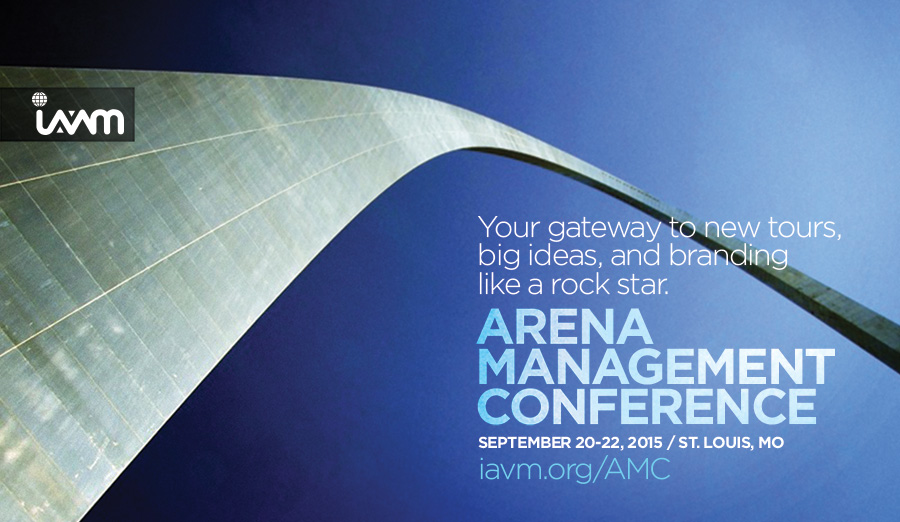
New Tours, New Connections at AMC
The 2015 Arena Management Conference (AMC) puts new tours center stage on Tuesday, September 22. First, it’s a look at non-musical tours hitting arena calendars with Mark Duryea, vice president, north american routing & tours, FELD Entertainment; and David Pitman, director, tour planning, Cirque Du Soleil.
Then, it’s on to the promoter and agent panel. After a meet and greet reception, Bredan Buckley, vice president, Columbus Arenas Sports & Entertainment, will moderate an interactive discussion with Paul Emery, founder, Emery Entertainment; Joe Litvag, senior vice president, AEG LIVE/AEG LIVE Events; Ed Rubenstein, CEO, ArenaNetwork; Aaron Tannenbaum, Music Agent, CAA; and Jay Williams, partner, WME.
To his AMC colleagues, Buckley says, “Engage! With this level of expertise at AMC, we have a great opportunity to discuss the issues that agents and promoters are facing, as well as the effects (today and tomorrow) those issues have on our side of the business.”
The afternoon block of touring sessions will be the perfect wrap-up for a conference entirely devoted to the business of arenas.
“IAVM is the best way to interact with industry colleagues that I have seen in my career,” continued Buckley, “the chance to blend that with industry experts that affect the rest of our daily business is an opportunity that should not be missed.”
The Rise of Festivals
One issue on the agenda for the agent and promoter panel is the continual rise of festivals in the evolving concert landscape.
In terms of 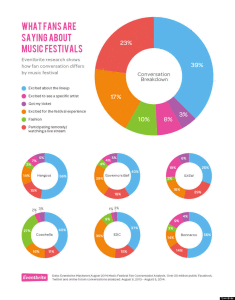 buzz, festivals are quite the conversation starter. A 2014 study by Eventbrite and Mashwork followed social media traffic for some of the largest U.S. festivals. Findings are unique to each festival (click the image at left for details, via Huffington Post), but two consistent attendee drivers are the artist line-up and the festival experience itself.
buzz, festivals are quite the conversation starter. A 2014 study by Eventbrite and Mashwork followed social media traffic for some of the largest U.S. festivals. Findings are unique to each festival (click the image at left for details, via Huffington Post), but two consistent attendee drivers are the artist line-up and the festival experience itself.
For promoters and owners like Live Nation and AEG, festivals are a rapidly growing slice of the $6 billion North American concert industry. As Niel Shah writes in the Wall Street Journal:
“In April, Live Nation bought a controlling stake in the Bonnaroo Music and Arts Festival in Manchester, Tenn., which featured Mumford & Sons, Billy Joel and Slayer this year. Last year, it purchased C3 Presents, the promoter of Lollapalooza, which kicks off Friday. Its other big acquisitions have included Insomniac Events, which produces Electric Daisy Carnival and other electronic-dance-music festivals. Live Nation says it holds four of America’s top five festivals by attendance, and 70 festivals world-wide. In 2012, it had none of the top five.
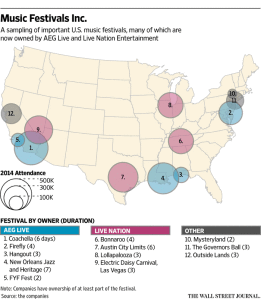
“Since 2010, AEG Live has added at least 12 major U.S. festivals to its portfolio, either through acquisitions, partnerships or launches. In January, it bought a controlling stake in the beachy Hangout Music Festival in Gulf Shores, Ala., and, before that, Firefly Music Festival in Dover, Del., two fast-growing festivals. In 2010, only 10 percent of AEG Live’s bottom line came from festivals; now it’s about a third, the company says.”
Festivals are big. Beacon Economics reports that 48 of the events promoted by Insomniac (Electric Daisy Carnival, Audiotistic, Beyond Wonderland, Electric Forest) generated $3.2 billion in U.S. economic activity between 2010 and 2014—including $180 million in taxes, and the equivalent of 25,000 full-time jobs.
How arenas adapt and evolve in the current concert environment is one of the big conversations happening at IAVM’s Arena Management Conference. There are challenges (always), but there are also opportunities that can be informed and shaped by the interest and economics currently driving the festival scene. Discovering the opportunities, identifying solutions, and finding the next steps forward is why we come together.
And, like any great show—be it in an arena or a cornfield—it’s impossible to explain to someone who wasn’t there.
Arena Management Conference
September 20-22, 2015
Hilton at the Ballpark, St. Louis, MO
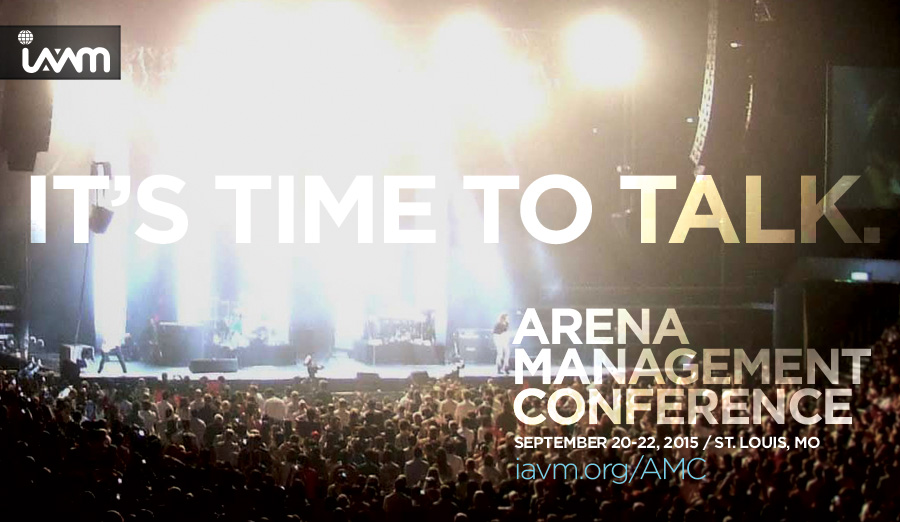
Photo: Imran Chaudhry / Flickr
Do you want to receive a Front Row News weekly digest?
Categories
- Allied (856)
- Architecture (147)
- Arenas (744)
- Career (890)
- Convention Centers (889)
- Education (608)
- Events (1,528)
- Food & Beverage (193)
- Foundation (113)
- Guest Experience (1,482)
- Industry News (2,253)
- Leadership (1,872)
- Marketing (150)
- Membership (1,985)
- Music (212)
- Performing Arts Centers (453)
- Professional Development (398)
- Research (127)
- Safety & Security (425)
- Sports (763)
- Stadiums (607)
- Student (159)
- Technology (515)
- Ticketing (92)
- Touring (82)
- Trends (357)
- Uncategorized (771)
- Universities (216)
- Video (25)
- Young Professional (198)
Twitter Feed
- Twitter feed loading
Recent Posts
- GEODIS Park Selects Allied Universal As Its Preferred Event Services Provider
- Venuworks Appoints Marc Solis as Executive Director of the Fresno Convention and Entertainment Center
- Los Angeles Convention Center Diverts 8,000 Pounds of Wood Waste to Local Foundation Supporting Fire Victims
- Fort Worth Unveils Plans for Phase 2 of Convention Center Transformation
- San Diego Convention Center CEO Announces Retirement After a Decade of Leadership
Categories
- Allied
- Architecture
- Arenas
- Career
- Convention Centers
- Education
- Events
- Food & Beverage
- Foundation
- Guest Experience
- Industry News
- Leadership
- Marketing
- Membership
- Music
- Performing Arts Centers
- Professional Development
- Research
- Safety & Security
- Sports
- Stadiums
- Student
- Technology
- Ticketing
- Touring
- Trends
- Uncategorized
- Universities
- Video
- Young Professional
Archives
- February 2026
- January 2026
- December 2025
- November 2025
- October 2025
- September 2025
- August 2025
- July 2025
- June 2025
- May 2025
- April 2025
- March 2025
- February 2025
- January 2025
- December 2024
- November 2024
- October 2024
- September 2024
- August 2024
- July 2024
- June 2024
- May 2024
- April 2024
- March 2024
- February 2024
- January 2024
- December 2023
- November 2023
- October 2023
- September 2023
- August 2023
- July 2023
- June 2023
- May 2023
- April 2023
- March 2023
- February 2023
- January 2023
- December 2022
- November 2022
- October 2022
- September 2022
- August 2022
- July 2022
- June 2022
- May 2022
- April 2022
- March 2022
- February 2022
- January 2022
- December 2021
- November 2021
- October 2021
- September 2021
- August 2021
- July 2021
- June 2021
- May 2021
- April 2021
- March 2021
- February 2021
- January 2021
- December 2020
- November 2020
- October 2020
- September 2020
- August 2020
- July 2020
- June 2020
- May 2020
- April 2020
- March 2020
- February 2020
- January 2020
- December 2019
- November 2019
- October 2019
- September 2019
- August 2019
- July 2019
- June 2019
- May 2019
- April 2019
- March 2019
- February 2019
- January 2019
- December 2018
- November 2018
- October 2018
- September 2018
- August 2018
- July 2018
- June 2018
- May 2018
- April 2018
- March 2018
- February 2018
- January 2018
- December 2017
- November 2017
- October 2017
- September 2017
- August 2017
- July 2017
- June 2017
- May 2017
- April 2017
- March 2017
- February 2017
- January 2017
- December 2016
- November 2016
- October 2016
- September 2016
- August 2016
- July 2016
- June 2016
- May 2016
- April 2016
- March 2016
- February 2016
- January 2016
- December 2015
- November 2015
- October 2015
- September 2015
- August 2015
- July 2015
- June 2015
- May 2015
- April 2015
- March 2015
- February 2015
- January 2015
- December 2014
- November 2014
- October 2014
- September 2014
- August 2014
- July 2014
- June 2014
- May 2014
- April 2014
- March 2014
- February 2014
- January 2014
- December 2013
- November 2013
- October 2013
- September 2013
- August 2013
- July 2013
- June 2013
- May 2013
- April 2013
- March 2013
- February 2013
- January 2013
- May 2012
- March 2012
- December 2011
- November 2011
- October 2011
Recent Comments
- Frank Bradshaw, Ph.D., CVE on John Meyer, CVE, a Tireless Advocate of Certification for Venue Professionals, Has Died
- Neil Sulkes on Hilary Hartung, Friend to Many in Venue Marketing, Has Left Us
- Jason Parker, CVE on The Devastation of Hurricane Helene and How We Can Support One Another
- Larry Perkins on Touhey Testifies Against Speculative Ticketing Before Congressional Subcommittee
- Peter Secord on Major Players for Planned Elkhart Amphitheater Were in the Mix at VenueConnect


